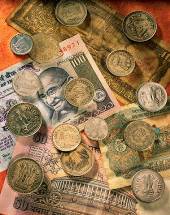 Dismissing concerns that India's growth rate may drop below 6.5 per cent, Finance Minister Pranab Mukherjee on Monday said 2012-13 would be the turnaround year for the economy.
Dismissing concerns that India's growth rate may drop below 6.5 per cent, Finance Minister Pranab Mukherjee on Monday said 2012-13 would be the turnaround year for the economy.
Addressing a conference of top officials of the Income Tax Department, he said steps are being taken to put India back on path of high economic growth.
"We are taking all necessary steps to ensure that we come back to the path of the targeted GDP growth. Of course it will take some time. . .but from this year we expect to make a turn around," Mukherjee said.
In the Budget 2012-13, the government had pegged 2012-13 gross domestic product growth at 7.6 per cent (plus, minus 0.25 per cent).
Following a 'disappointing' economic growth of nine-year low of 6.5 per cent in 2011-12, there have been concerns that India's expansion rate this fiscal may slip further.
Mukherjee said that after the 2008 economic crisis, the GDP growth slipped to 6.7 per cent in 2008-09, but bounced back to 8.4 per cent in the following two financial years.
Highlighting the positives in the economy, Mukherjee said interest rate cycle has been reversed and there is growth in mining sector, turnaround in investment growth rate and there are predictions of normal monsoon, besides decline in crude oil prices.
"All these factors should help in recovery of domestic growth momentum," he added.
On direct tax collection target of Rs 5.70 lakh crore (Rs 5.7 trillion) for the current fiscal, he said it was achievable.
"I do feel this target is moderate and can be achieved," he said while asking the tax officials to work "relentlessly" to improve tax collection.
In 2011-12, the direct collection at 4.95 lakh crore (Rs 4.95 trillion) was marginally down from the revised target of 5.05 lakh crore (Rs 5.05 trillion).
Mukherjee said that while renewed growth momentum will help improve direct collection, there are several challenges before the I-T department.
He expressed concern over decline in tax-GDP ratio and asked the officials to reverse the trend.
The tax-GDP ratio has dropped to 10.5 per cent in 2011-12, from 12 per cent in 2007-08.
Mukherjee said the direct tax code Bill will be introduced in Parliament in the forthcoming Monsoon Session and would be affected from next fiscal.
"I am hoping that DTC will be effective from April 1, 2013," he said, adding that the time has come for the I-T Department to prepare itself for the transition from the Income Tax Act, 1961 to the new direct tax regime.
The Finance Minister further said the department has been striving to check the menace of black money and tax evasion, which eat into the vitals of the economy and pose threats to national security through linkages to money-laundering
He said the government has commissioned a study on unaccounted income and wealth and it is likely to be completed in September.
Also, a report of a committee on strengthening of existing laws relating to black money is being examined by the government.
"I hope that these two studies will help in identifying the gaps in present legislative and administrative framework and shall help us in checking the menace of black money through an effective policy response," Mukherjee added.
He also said introduction on the Benami Transactions (Prohibition) Act, 2011, currently being scrutinised by a Parliamentary Standing Committee, will further help in 'our resolve to reduce the menace of black money'.
Amid undeclared assets held by Indians abroad being a matter of 'intense debate recently', Mukherjee said that to encourage and facilitate real time exchange of information on cross-border transactions with other jurisdictions, India has set up 8 more Income Tax Overseas Units.
After a comprehensive review of the existing network, steps are being taken to augment the reach of the ITOUs in more jurisdictions, he added.
Enlarged network of ITOUs, with an enabling legislative framework in the form of Double Taxation Avoidance Agreement and Tax Information Exchange Agreement, will help in receiving valuable information in future, he said.
On promoting voluntary compliance of tax laws and role of children, Mukherjee said there was a need to educate them on the importance of taxes for the nation building process.
He said the I-T Department has partnered with NCERT to introduce information in this regard in school textbooks.
He, however, expressed concern over rising litigation with tax payers and amount locked up in appeals before CIT (A), ITAT and different courts.
A whopping over Rs 4.36 lakh crore (Rs 4.36 trillion) was locked in about 259,000 cases as on December 31, 2011.
The main reason for pendency of cases before CIT (A), he said, appears to be slower disposal rate vis-a-vis the pace of cases being filed.
On an average, it takes about one and half years to dispose of a case.
"The Department needs to ensure that after proposed cadre restructuring sufficient manpower is deployed to reduce the time taken for disposal of appeals and that it is not more than six months" he added.
Mukherjee said he has been directing the I-T Department to reduce all avoidable litigation with the taxpayers as well as with employees.
"I have also asked CBDT to ensure that no charge sheets are filed on the last date of retirement," Mukherjee said.








